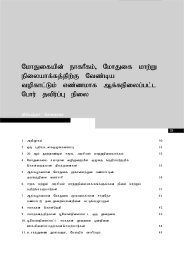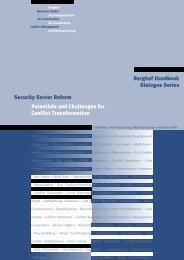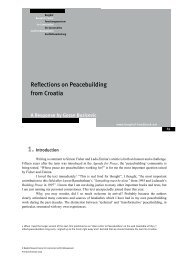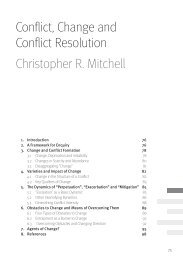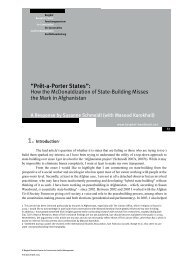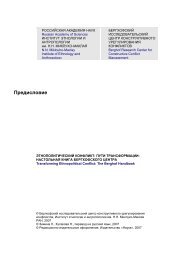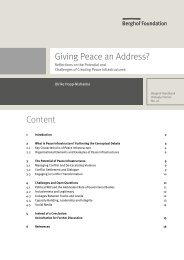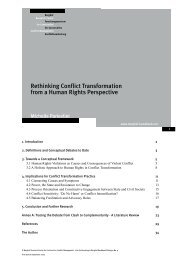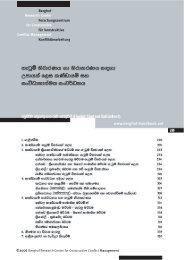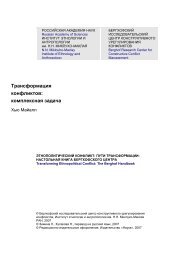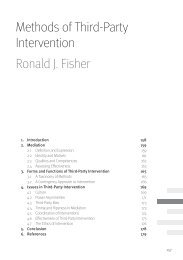Human rights and conflict transformation: The challenges of just peace
Human rights and conflict transformation: The challenges of just peace
Human rights and conflict transformation: The challenges of just peace
Create successful ePaper yourself
Turn your PDF publications into a flip-book with our unique Google optimized e-Paper software.
92<br />
Bergh<strong>of</strong> H<strong>and</strong>book Dialogue No. 9<br />
between the Palestinians <strong>and</strong> Israelis are symmetrical, it is still possible to identify similar attitudes<br />
towards each other based on fear, lack <strong>of</strong> trust, hatred, dehumanisation, anger <strong>and</strong> the <strong>just</strong>ification<br />
<strong>of</strong> using measures that will cause human <strong>rights</strong> violations.<br />
Cooperating with Israeli Jewish civil society organisations is a very controversial issue that<br />
has divided Palestinian civil society in the occupied territories, where the dominant voice at this point<br />
does not support such a “dialogue”. Only a limited number <strong>of</strong> Palestinians are prepared to accept this<br />
as a way forward. However, the situation is different amongst Palestinian NGOs in Israel, despite the<br />
division that already exists; there has been a shift in thinking amongst some <strong>of</strong> the leading Palestinian<br />
NGOs in Israel about the need to develop a strategy <strong>and</strong> approach for engaging with both Israeli society<br />
<strong>and</strong> state structures. Parlevliet endorses the idea raised by Clements that there is an opportunity for<br />
<strong>conflict</strong> <strong>transformation</strong> practitioners to play a facilitative role between society <strong>and</strong> state (Parlevliet in<br />
this volume, 29; Clements 2004). <strong>The</strong> number <strong>of</strong> <strong>conflict</strong> <strong>transformation</strong> organisations <strong>and</strong> practitioners<br />
in Israel/Palestine is acutely small, <strong>and</strong> therefore further capacity-building in <strong>conflict</strong> <strong>transformation</strong>,<br />
while providing space for civil society organisations to meet, analyse, reflect on their work <strong>and</strong> develop<br />
joint strategies for intervention, has powerful potential <strong>and</strong> should be given priority.<br />
A multi-dimensional underst<strong>and</strong>ing <strong>of</strong> human <strong>rights</strong>, <strong>and</strong> also <strong>of</strong> development <strong>and</strong> <strong>conflict</strong><br />
issues, will enable human <strong>rights</strong>, <strong>conflict</strong> <strong>transformation</strong> <strong>and</strong> development organisations who are<br />
engaged in the struggle for <strong>peace</strong> <strong>and</strong> <strong>just</strong>ice to develop a multi-faceted strategy for intervention<br />
to transform the conditions that have given rise to discrimination <strong>and</strong> oppression. This will further<br />
require coordination <strong>and</strong> networking amongst organisations to develop a joint strategy. <strong>The</strong> SG<br />
brought together members from a variety <strong>of</strong> organisations. One participant commented on the<br />
<strong>conflict</strong> <strong>transformation</strong> training he had acquired as follows: “Windows have been opened in the<br />
mind; we are beginning to think in different ways about how to deal with issues. If you lived inside<br />
a room, all your thinking would be confined to that room. Without a window you would think the<br />
room was the world” (RTC 2007). In my experience <strong>of</strong> working with Palestinian <strong>and</strong> Israeli NGOs to<br />
integrate the principles <strong>and</strong> values <strong>of</strong> <strong>conflict</strong> <strong>transformation</strong> into their development <strong>and</strong> community<br />
work, this has laid the foundation for a society which respects <strong>and</strong> promotes a culture <strong>of</strong> human<br />
<strong>rights</strong>, including social, economic <strong>and</strong> political <strong>rights</strong>.<br />
Finally, designing strategies for <strong>conflict</strong> <strong>transformation</strong> ultimately raises questions about<br />
our theory <strong>of</strong> change <strong>and</strong> change processes. How do we believe change happens? And what are our<br />
assumptions about change? However implicit or explicit our theory <strong>of</strong> change is, it will inform our<br />
strategy for intervention <strong>and</strong> action planning. For example, the lead article raises the issue <strong>of</strong> state<br />
power <strong>and</strong> “structural division <strong>of</strong> power <strong>and</strong> resources in society” (Parlevliet in this volume, 22).<br />
However, the <strong>conflict</strong> in Israel/Palestine is asymmetrical in its division <strong>of</strong> power <strong>and</strong> in its nature,<br />
as Israel holds most <strong>of</strong> the power both in the region <strong>and</strong> internationally which manifests itself in<br />
power over the Palestinians. Consequently, many <strong>conflict</strong> <strong>transformation</strong> <strong>and</strong> social change activists<br />
face an acute challenge, namely, how to transform such imbalanced power structures <strong>and</strong> policies<br />
constructively <strong>and</strong> without violence? I highlighted previously the need for an internal focus, but<br />
want to also underline here the need for external actors to play a role in this process. It is important<br />
to have a regular <strong>conflict</strong> analysis <strong>of</strong> the situation both at the national <strong>and</strong> international level, to<br />
identify new alliances <strong>and</strong> entry points. It might also be necessary to lobby <strong>and</strong> mobilise support <strong>and</strong><br />
solidarity campaigns to intensify the <strong>conflict</strong> <strong>and</strong> bring it out into the open, in order to expose the<br />
violation <strong>of</strong> human <strong>rights</strong> <strong>and</strong> the need for a <strong>just</strong> <strong>and</strong> <strong>peace</strong>ful solution (Curle 1971; Francis 2002).<br />
As the lead article argues, “there is much scope for empowerment, mobilisation <strong>and</strong> advocacy in<br />
social change processes” (Parlevliet in this volume, 27), even if this will mean boycott, divestment<br />
<strong>and</strong> sanctions, as the Palestinian network <strong>of</strong> NGOs 7 is advocating.<br />
7 <strong>The</strong> Palestinian Network <strong>of</strong> NGOs is online at www.pngo.net/default.asp?i=190 (last accessed 25 October 2009).






